
BECOME A MEMBER
Gain an influential voice in consensus with other experts that will have a real impact on reducing world hunger, improving food safety and nutrition, and supporting new technology applications. Membership is free. Enroll online today! |
GHI LEADERSHIP
Dr. h.c. Huub Lelieveld
President, Netherlands
Mr. Larry Keener,
Vice-President, USA
Dr. Gerhard Schleining
Treasurer, Austria
Mag. Michaela Pichler
Supervisory Board, Austria
Nathalie Persson-Andrianasitera
Global Councillor, Sweden
Ms. Adriana Sterian,
MSc.
General Secretary, Netherlands
Dr. Sangsuk Oh
Member-at-Large, Korea
Dr. Bernd van der Meulen
Member-at-Large, Netherlands
Dr. Joe Mac. Regenstein
Member-at-Large, USA
Dr. Alina-Ioana Gostin
Ambassador Programme Director, UK
Ms. Adriana Sterian, MSc.
Communications Dir.,Netherlands
Ms. Ana Sanhueza Martín, MSc.
Membership Director, Spain
Ms. Nicole Coutrelis
Regulatory Advisor, France
Dr. Bernd van der Meulen
Legal Advisor - Food, Netherlands
Dr. Sian Astley
Editorial Advisor, UK
Mr. Grigor Badalyan
Newsletter Publisher, Germany
Dr. Aine Regan
Social Media Advisor, Ireland
Mr. Gunter Greil
Webmaster, Austria
Dr. Paul Popescu
Newsletter Editor, Romania
Mr. Alex Surugiu
Graphic Designer/Videographer, Netherlands
Dr. Diana Bogueva
Working Group Coordinator, Australia
|
 |
GHI SUPERVISORY BOARD
Ms. Michaela Pichler (Chair)
EuCheMS Food Chemistry Division, Graz, Austria
CSIRO, Werribee, Australia
The Ohio State University, Columbus, Ohio, USA
Fuzhou University and Chinese Institute of Food Science and Technology, Fujian, China
Roosevelt Academy, Tilburg,
The Netherlands
EuroFIR, Brussels, Belgium
Universidad Central de Venezuela, Venezuela
Dr. Kwang-Ok Kim
Ewha Womans University, Seoul, Korea
GHI AUDITORS
Dr. Pablo Juliano
Australia
|
ATTEND A MEETING
|
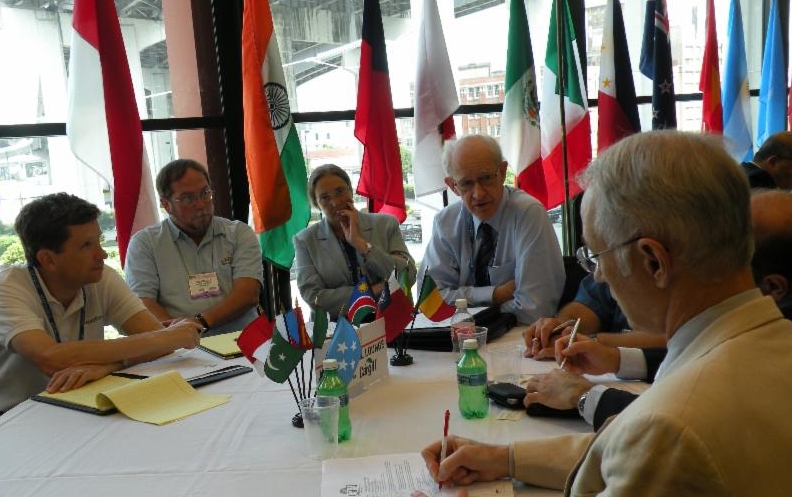 Plan to participate at
upcoming GHI Meetings!
Plan to participate at
upcoming GHI Meetings!
In the coming months, GHI will hold several general meetings, working group gatherings, and make presentations at scientific meetings all over the globe.
|
|
|
President's message
Dear Readers,
In line with the hope I expressed in the message in the first issue of this year, I hope that everybody will be able to cope with the consequences of the Corona Virus Disease 2019 (COVID-19), caused by the "new" coronavirus SARS-CoV-2. Hopefully the presentations and posters that many of our members had prepared for conferences that have been cancelled now, may be presented at a later date when the postponed events will take place.
GHI officers are always volunteers who due to the crisis suddenly have a very different life. They may for instance have to teach their children, at home. Fully understandably GHI Matters has a much lower priority now. Therefore, you may miss some information that hopefully will be in the forthcoming issues.
I hope that all readers stay healthy and will not suffer losses, but I am afraid that some of you will do. If so, I wish you strength to bear this. Let us hope for a working and safe vaccine as soon as possible.
Despite the above, please take time to go through the contents of this issue, because chances are high that there is news that is of interest to you.
Take care!
Huub Lelieveld
17 April 2020
|
|
|
Covid-19 pandemic
In the past weeks we been asked for advise on measures to prevent the spread by food of the Covid-2 virus, responsible for the Covid-19 pandemic. So far the specialists among us are struggling to deal with the pandemic while still lacking sufficient information about the virus. In many countries virologists are doing research to find the answers. After the crisis we might consider whether there is a need for reaching consensus about such measures, to deal with the next crisis, which according to many experts will certainly come and we better be prepared. For the moment, however, it may be useful to consult the report of an Extraordinary Scientific Roundtable Discussion "COVID-19 and Food Safety and its Implications, Challenges and Solutions for the Food Industry ", organised jointly by International Union of Food Science and Technology (IUFoST) and the Chinese Institute of Food Science and Technology (CIFST). The
report can be downloaded from the GHI Library.
As no doubt you have noticed, there are many Corona warning videos on
YouTube. One of them is
https://youtu.be/rAj38E7vrS8. Once it has finished you will automatically be directed to more of such videos.
|
|
Fundación Triptolemos
The
Fundación Triptolemos
(
Triptolemos Foundation
) recently published the report "Food security and innovative tools with a sustainable global food system approach". The report discusses the need to produce in the next half century as much food as in the previous ten thousand years and how that might be achieved. This high-quality report can be
downloaded
from the Triptolemos website.
|
|
| |
|
Working Group Genetically Modified based Plant Food
In March this year the working group "GM based Plant Food" was started. The Chair of the WG is Dr. Stefan Jansson of the Department of Plant Physiology of the Umeå universitet in Sweden. The WG intends to develop a consensus statement on genetically modified plants. Details will soon be published on the web page of the WG.
|
GHI/Acad Food Contamination and Traceability Summit, Munich, Germany, 26-27 May 2020
Most likely you know already that this event, like many events in the coming months, has been cancelled. When and where the Summit will be held is still uncertain will depend on the development of the Covid-19 pandemic. We hope to be able to publish such information in the next issue of GHI Matters.
|
The 20th World Congress of Food Science and Technology
As usual, during the
20th World Congress
, there will be a GHI Session as well as a general GHI meeting, open to all Congress participants. Details will follow in the next issue of GHI Matters.
|
UNIFood Conference, University of Belgrade, Serbia, 25-26 September 2020
GHI members are invited to participate in this conference, chaired by Prof. Dr. Mirjana Pesic of the Faculty of Agriculture of the University of Belgrade - President of Scientific Committee and GHI Ambassador in Serbia. For details of this GHI-endorsed conference click
here
.
|
Application for endorsing an event
Organizers of conferences and other events related to food safety and food or nutrient security may apply for GHI endorsement. If endorsement is approved, the Event Organiser may use the GHI logo and GHI will announce the event in GHI Matters, the newsletter of GHI that is published five times a year and on the GHI website
calendar page
. Note that endorsement does not mean that GHI will provide financial support. To obtain endorsement by GHI, the event organiser needs to send an request to the
Events Coordinator
, providing all relevant information, including name, address, website and contact data of the organiser of the event; name, location (venue), website, start date and end date of the event; the goal of the event and a (preliminary) programme. Further details can be found here.
|
Urbanization, Industrialization, and the Environment
Viduranga Waisundara, GHI Ambassador in Sri Lanka and editor of many books that are relevant to the goal of GHI, is also Series Editor for books about 'Urbanization, Industrialization, and the Environment', to be published by CRC Press/Taylor & Francis, Oxford. If you are interested in editing a volume under this book series, please
contact Viduranga
.
|
Outbreak: Foodborne Illness and the Struggle for Food Safety
In the September 2019 issue of GHI Matters the above book by Timothy D. Lytton was announced. Meanwhile, Heidy M.W. den Besten (Wageningen University and Research) has read and reviewed the book:
Food safety systems have been implemented to reduce foodborne illness caused by microbial pathogens. This book describes how the US food safety system works. Each chapter illustrates a case study of an outbreak in a sector of the food industry as a means of exploring a particular aspect of the food safety system. It introduces the reader to the different actors - the government, the industry and sector associations and consumer advocacy groups - and their role within the food safety system. The book maps the complexity of the food safety system, and shows how progress has been made to advance current food safety systems. The introduction chapter emphasizes that even highly effective regulatory programs tolerant a certain amount of risk, as zero risk is simply not possible. The book also uses the case studies to describe the history of implementation of food safety systems - from pasteurization of milk and canning of foods to the Food Safety Modernization Act. The author advocates two reforms to improve the food safety system: i) focusing government investment in food safety on improving the infrastructure of outbreak investigations rather than on hiring and training more agency inspectors to reduce uncertainty about the root causes of foodborne illnesses, and ii) greater reliance on buyer-funded audits carried out by governmental inspectors on a fee-for-service basis, and when buyers insist on private auditors, subjecting private auditors to civil liability for negligence to foster more reliable oversight to ensure rigorous implementation of food safety efforts.
In terms of style the book is not too technical and easy to ready. The historical notes give the reader a clear time frame of the formation of various food safety related organizations and the dynamics of implementation of guidelines or regulations. The book succeeds in illustrating the struggle to control food safety the last century and how outbreaks prompted industry and government to implement reforms and regulations. In reading the book it becomes clear how difficult it is to evaluate the impact of food safety efforts. The case examples clearly illustrate the interdependence of governmental regulation, industry supply chain management, and civil liability in the evolution of the food safety system, and shows that both public and private actors play an essential part in the dynamic evolution.
The book is available from Amazon.com and the University of Chicago Press. Use promo code UCPNEW for a 20% discount.
|
Special message from
Prof. Dr. Anet Rezek Jambrak
Dear friends and colleagues,
Hope you are all well and safe! I would like to invite you to contribute to special issues of two journals:
1. Special Issue "Nonthermal and Advanced Food Processing Technologies: Industry 4.0 and Sustainability". This special issue belongs to the section "Food Science and Technology" of Applied Sciences (ISSN 2076-3417).
Guest Editors: Anet Rezek Jambrak, Farid Chemat, Giovanna Ferrari and Sanda Pleslić.
AIM
The aim of this special issue is to invite groundbreaking research idea focused on application of nonthermal and advanced thermal food processing techniques in research and industry. Up to now, nonthermal technologies include high power ultrasound, pulsed electric fields, high voltage electrical discharge, high pressure processing, UV-LED, pulsed light, e-beam, and advanced thermal food processing techniques includes microwave processing, ohmic heating, high pressure homogenization etc. Review papers on the state of the art of the tools of industry 4.0, including smart manufacturing, simulations and process integrations that are applied or can be implemented in the food industry are of great interest. Reviews on digitalization, internet of things (IoT), additive technologies (3D printing), cloud data storage, smart sensors connected with application of nonthermal and advanced thermal technologies as well as synergy of combination and connective application of nonthermal technologies and advanced thermal technologies will be highly welcomed. Research and review papers on the application of artificial intelligence (AI), deep learning, machine learning, cybersecurity and blockchain future application in nonthermal and advanced thermal processing will be highly welcomed. The idea of applying the aforementioned nonthermal and advanced thermal techniques is lower working temperatures, reduce energy consumption, lower carbon footprint, reduce water depletion and improve life cycle assessment parameters. Nonthermal and advanced thermal technologies can be applied also as sustainable techniques working in line with the sustainable development goals (SDG) and Agenda 2030 issued by United Nations (UN).
Deadline for submission of manuscripts: 31 October 2020.
2. Special Issue "Vulnerability to Fraud and Quality Consequences of Food Fraud". Journal of Food Quality. Open Special Issues.
Lead Editor: Ilija Djekić.
Guest Editors: Anet Rezek Jambrak, José M. Lorenzo and Igor Tomasevic
AIM
Fraudulent behavior that covers adulteration, dilution, or substitution of any kind associated with food, food ingredients, or food packaging as well as false, missing and misleading statements or food labelling is considered to be food fraud. Although food fraud is mainly economically motivated, resulting in the reduction of food quality, some fraudulent activities may compromise food safety by introducing potential contaminants as adulterants.
Food fraud related challenges that have been recognized lately mainly comprise of the development of new detection methods, deployment of novel fraud root cause analysis, the need for new food regulation, risk assessment of fraud vulnerability associated with food, food supply chain, mitigation measures and fraud criminology.
This Special Issue aims to attract both original research articles on new methods for preventing or detecting food fraud, and review articles that describe the current state of the art related to the various dimensions of food fraud. Articles relating to the quality of food that is affected by food fraud are also welcomed.
Potential topics include but are not limited to the following:
* Food fraud types recognized in food science
* Modeling and evaluating food fraud risks
* Exploring perspectives for combating food fraud through data mining
* Fraud vulnerability assessment tools
* Motives behind fraudulent behavior
* Food authentication and food fraud
* Food safety hazards caused by food fraud
* Novel analytical methods for detecting food fraud
* Food fraud control and food law
* Links sensitive to food fraud in the food chain
* Trust in the supply chain and prevention of food fraud
* Consumer perceptions related to food fraud
Deadline for manuscript submissions: 21 Aug 2020
Detaills: https://www.hindawi.com/journals/jfq/si/103526/
|
From fed by the world to food security
Accelerating Agricultural Development in Africa
by Henk Breman, Antonius G.T. Schut, & No'am G. Seligman
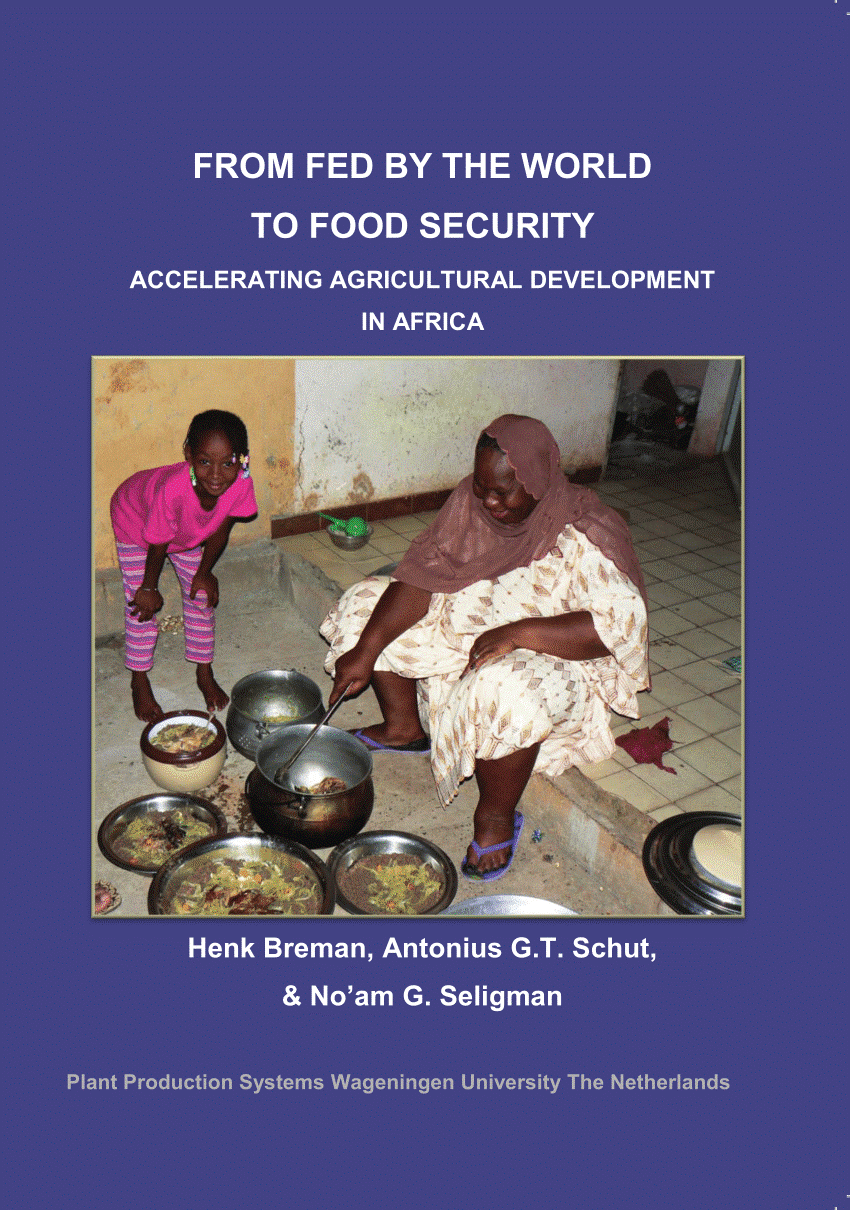 Regrettably, Africa is still the most food insecure continent. One of the reasons is that in most African countries the yields are much lower than in the rest of the world. More important even than rainfall is infertility of the soil. The use of fertilisers in Africa is 9 times lower than the global average (Africa 15 kg/hectare per year against the world average of 135). The authors of the book studied the African continent with the aim to determine what can be done to accelerate agricultural development. The book contains a vast amount of information and is important reading for everybody interested in improving food security, in Africa and elsewhere. Published by Plant Production Systems, Wageningen University, The Netherlands, September 2019 and freely
downloadable
. Regrettably, Africa is still the most food insecure continent. One of the reasons is that in most African countries the yields are much lower than in the rest of the world. More important even than rainfall is infertility of the soil. The use of fertilisers in Africa is 9 times lower than the global average (Africa 15 kg/hectare per year against the world average of 135). The authors of the book studied the African continent with the aim to determine what can be done to accelerate agricultural development. The book contains a vast amount of information and is important reading for everybody interested in improving food security, in Africa and elsewhere. Published by Plant Production Systems, Wageningen University, The Netherlands, September 2019 and freely
downloadable
.
|
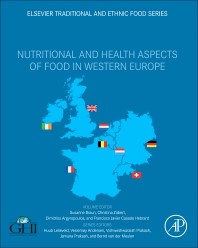
Nutrition and health aspects of traditional and ethnic foods in
Western Europe
Edited by Susanne Braun, Christina Zübert, Dimitrios Argyropoulos and Francisco Javier Casado Hebrard
This volume of the 26 volume-large GHI series has been published on
15 October 2019 and can be ordered from the website of Elsevier. Remember to use GHI30 to obtain a 30% discount.
|
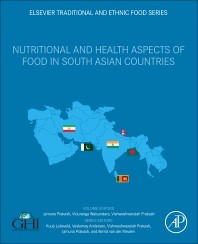
Nutrition and health aspects of traditional and ethnic foods in South Asia
Edited by Jamuna Prakash, Viduranga Waisundara and Vishweshwaraiah Prakash
This GHI book of the same series has been completed and will be available on 1 March 2020, it can be
ordered
now from Elsevier and remember, by using code GHI30, you will receive a 30% discount.
|
Genetically Modified and Irradiated Food - Controversial Issues: Facts
versus Perceptions
Edited by Veslemøy Andersen
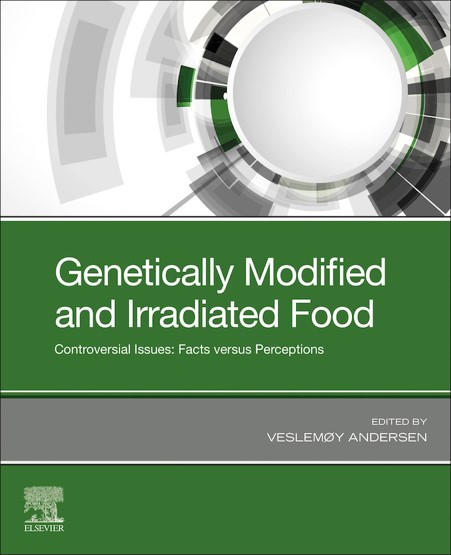 The editor is GHI Ambassador for Norway and also Lead-Editor of the 1st book of the "Nutrition and health aspects of traditional and ethnic foods" series (about the Nordic Countries), of which she also Series Editor. The book debunks the nonsense published about two of the technologies that are likely to be crucial for mankind to survive with almost 8 billion inhabitants on a small planet. The chapters in the book have been written by renowned experts with the interested non-scientists and scientists in other disciplines in mind. Contrary to many popular books intended to give these technologies a bad name, all chapters have a large number of references enabling readers to check the scientific research underpinning the conclusions of the chapters. The editor is GHI Ambassador for Norway and also Lead-Editor of the 1st book of the "Nutrition and health aspects of traditional and ethnic foods" series (about the Nordic Countries), of which she also Series Editor. The book debunks the nonsense published about two of the technologies that are likely to be crucial for mankind to survive with almost 8 billion inhabitants on a small planet. The chapters in the book have been written by renowned experts with the interested non-scientists and scientists in other disciplines in mind. Contrary to many popular books intended to give these technologies a bad name, all chapters have a large number of references enabling readers to check the scientific research underpinning the conclusions of the chapters.
The book will be published on 17 January 2020 and can be
ordered
now. Use GHI30 for the 30% discount.
|
|
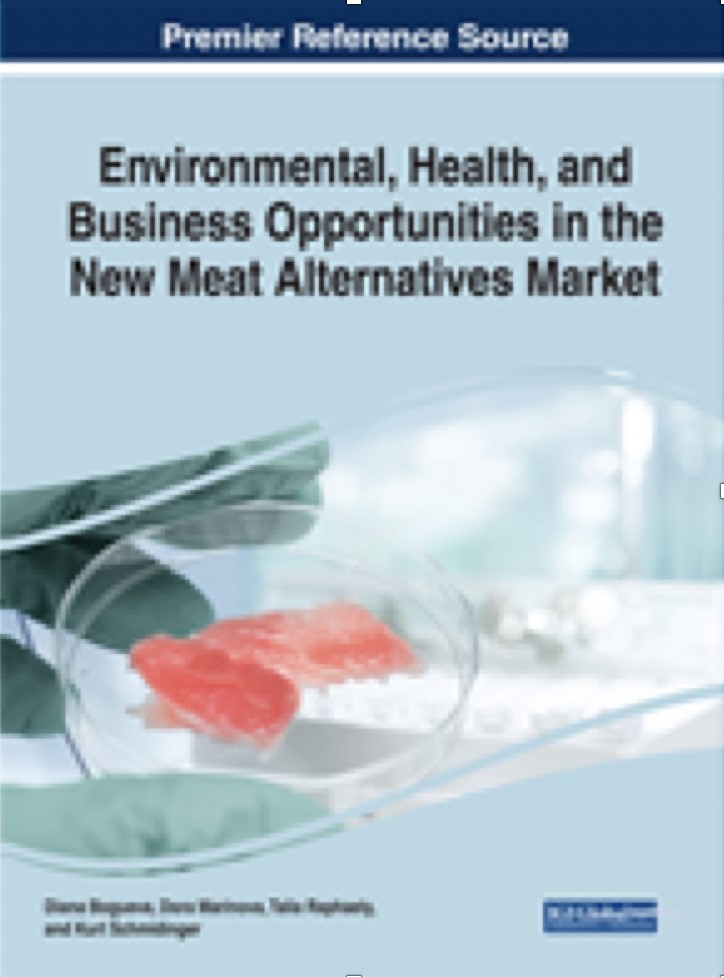
The book
Environment, Health and Business Opportunities in the New Meat
Alternatives
Market,
with Lead-Editor GHI Ambassador in Australia, Diana
Bogueva, won not only the 24th Australian Gourmand Award, but now also
the Best in the World Gourmand Award
. These awards are the equivalent of Oscars but for food related books. The
book
is a pivotal reference source that provides vital research on the development of plant-based foods and nutritional outcomes and thus very important for everybody interested in food security. The book is designed for policymakers, economists, health professionals, nutritionists, technology developers, academicians, and graduate-level students. Co-editors are Dora Marinova (Australia), Talia Raphaely (Australia) and Kurt Schmidinger (Austria).
Editors, Congratulations with these achievements!
|
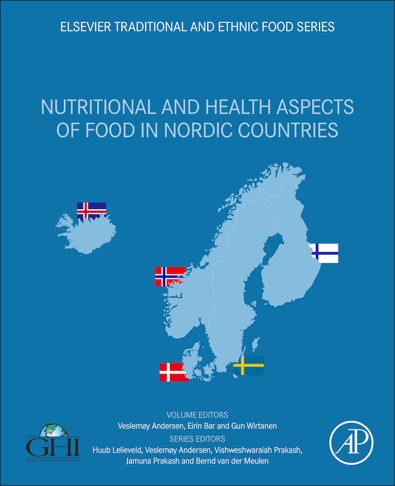
"Nutrition and health aspects of traditional and ethnic foods in Nordic Countries"
Edited by Veslemøy Andersen, Eirin Bar And Gun Wirtanen, is the first volume of the series of 26 books a
bout the topic, covering the entire globe. This volume discusses the nutrition and health aspects of Norway, Sweden, Denmark, Finland, Iceland as well as Sápmi, also known as Lapland. It is published by Elsevier/Academic Press 2018. ISBN: 978-0-12-809456-3 (eBook) and 9780128094167 (print). Note that, as with all food science books published by Elsevier, using the code GHI30 gives you a 30% discount.
Copies of the first two GHI's books are still available:

Ensuring Global Food Safety
- Exploring Global Harmonization.
Elsevi
er/Academic Press, 2009.
ISBN: 9780123748454 (print) 9780080889306 (eBook)
|

Regulating Safety of Traditional and Ethnic Foods.
Elsevier/Academic Press, 2015.
ISBN:
9780128006054 (print) 9780128006207 (eBook)
|
|
|
|
|